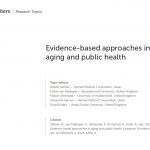 In an effort to record the outcomes and impact of research beyond the end of a funded project, Research Councils UK (RCUK) have been developing a system to gather the relevant quantitative and qualitative evidence. The information collated will be an important part of the Research Councils’ strategy development, and will be crucial in demonstrating the benefits of RCUK-funded research to society and the economy.
In an effort to record the outcomes and impact of research beyond the end of a funded project, Research Councils UK (RCUK) have been developing a system to gather the relevant quantitative and qualitative evidence. The information collated will be an important part of the Research Councils’ strategy development, and will be crucial in demonstrating the benefits of RCUK-funded research to society and the economy.
Currently, the Research Outcomes Project remains on course to go live in summer 2011, although a full roll out may not occur until autumn. Grant holders will be required to provide information on the following output types:
- Publications
- Collaboration
- Communication
- Exploitation
- Recognition
- Staff Development
- Further Funding
- Impact
The idea is for the system to allow outcomes to be reported at any point during the funding agreement and beyond, recognising that impacts from research are often realised some time after funding agreements have been completed.
The project team are engaging with users to ensure the system will be easy to use and aligned as far as possible with universities’ own research management information systems. A focus group of research managers provided feedback on the system, which is currently being built, and a pilot exercise is due to take place in August 2011.
BU is currently following the development of the Research Outcomes Project and will be looking at ways to help academics provide the required data in due course. In the meantime, please contact Anita Somner if you have any questions. To raise queries or concerns, or to make suggestions to RCUK, you can use the project email address: researchoutcomes@rcuk.ac.uk .


















 New eBook published in April
New eBook published in April Café Scientifique Tuesday 4 June 2024 – How can we become more resilient in the face of multiple risks and hazards?
Café Scientifique Tuesday 4 June 2024 – How can we become more resilient in the face of multiple risks and hazards? MSCA Postdoctoral Fellowships 2024
MSCA Postdoctoral Fellowships 2024 Horizon Europe News – December 2023
Horizon Europe News – December 2023